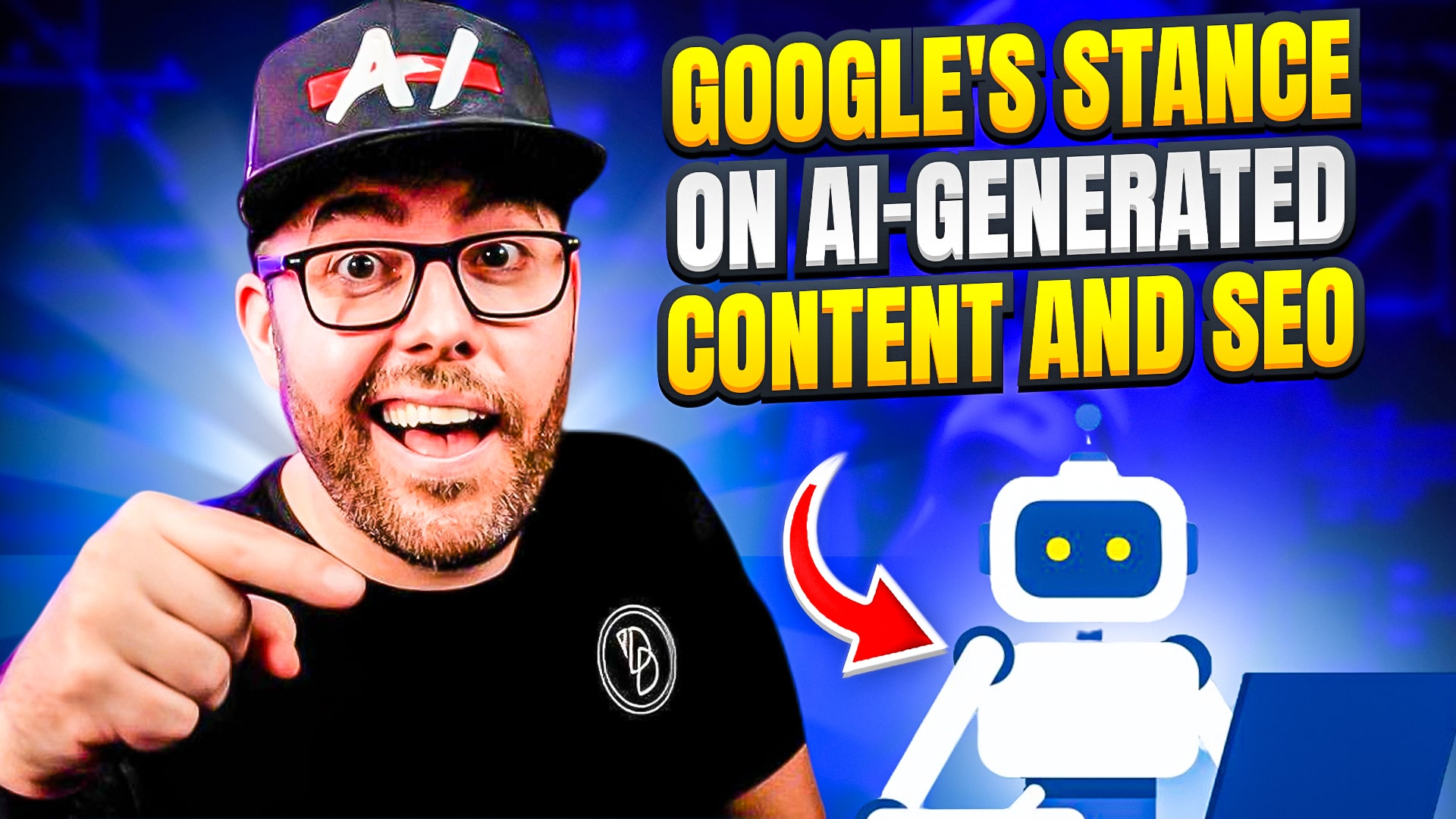
Whether you’re a marketer, copywriter, blogger, or journalist, you likely have questions about how AI-generated content impacts your work.
While the first versions of AI writing tools didn’t create much of a buzz, the latest AI language model called ChatGPT has gone viral. It’s widely considered the best free AI content generator available and had more than a million users within just five days of its November 2022 launch.
People who want to know how AI-generated content affects SEO performance have questions like:
- Does AI content rank in Google?
- Is it ethical to use AI writing tools for creating content?
- How can AI-written content rank in search engines?
Since AI-generated content is here to stay, it’s important to understand how to make the most of it and prevent it from negatively affecting your rankings in search engines. In this article, we’ll cover that and more.
What is AI-Generated Content?
AI-generated content refers to the production of digital media like text, images, or audio, by artificial intelligence algorithms and models.
The output is generated based on natural language processing (NLP) and machine learning techniques which allow AI tools to understand and mimic human language.
With the goal to create output that is virtually indistinguishable from that created by a human, it produces original content similar in style, tone, or structure to the data it has been trained on.
AI-generated content can be used for:
- Website and social media content creation – From blog posts to social media captions, newsletters, product descriptions, ad copy, landing pages, and more, AI-generated text makes it easier, faster, and more efficient for businesses to create high-value and high-quality content.
- Automated customer service – AI can generate text and speech, which can then be used to respond to customer inquiries.
- News and information – AI can also produce news stories and articles on any topic. Outlets who want to stick to human-written content can still benefit from AI by using it to quickly create article outlines.
While all this sounds like it can save humans lots of time and work, it’s important to remember that AI-generated content isn’t without flaws. It still has limited abilities and often makes mistakes.
However, the founders of the famous AI language model ChatGPT and others are aware of these shortcomings and are working to improve their tools.
Does AI-Generated Content Hurt Google SEO?
Most online businesses depend on search engine optimization (SEO) to drive traffic to their sites. If this includes you, it’s essential that you understand the implications of using AI-generated content and its impact on SEO performance.
Here’s what Google’s spoke person John Mueller said on Mastodon (a free and open-source software for running self-hosted social networking services):
“I don’t know if AI is the right approach to making titles & descriptions, but if you’re running out of ideas, and especially if you see pages showing up in search for the wrong terms, it seems like a good way to get inspiration, or to try new things out. I would strongly discourage blindly following it though: you know your audience much better than any tool.”
Mueller also pointed out that while AI writing tools produce better quality content than older tools, they’re essentially automated-generated content, which is against the webmaster’s guidelines. Automatically generated content is basically the same as simply shuffling around words or using synonyms or translation tricks.
All this could sound concerning if Google could differentiate between AI and human-generated content. When asked if it can, Mueller didn’t have a straightforward answer.
He said: “I can’t claim that [Google can differentiate between AI and human content]. However, if the web spam team sees anything that is automatically generated, they will take action.”
Since AI content writer ChatGPT launched in November 2022 and quickly went viral, Google made the following statement about artificially generated content and its impact on SEO:
“We haven’t said AI content is bad. We’ve said, pretty clearly, content written primarily for search engines rather than humans is the issue. That’s what we’re focused on. If someone fires up 100 humans to write content just to rank, or fires up a spinner, or AI, same issue…”
Put simply, if it is reviewed and doesn’t negatively affect the end-user experience, Google isn’t against AI-generated content. That means you won’t get penalized by the Google web spam team as long as you fact-check and edit AI content before publishing it.
What Are the Cons of Using AI-Generated Content for SEO?
With AI writing tools like ChatGPT imperfect and still in their research phase, they come with certain deficiencies. The main ones include:
- Quality and Fact Checking – The most significant issues with AI content are its authenticity, quality, and relevance to the user query. Relying only on AI tools to create your content can leave you with major mistakes that you may not notice but could damage your brand reputation.
- Plagiarism – If you use AI-generated content that includes phrases from other sources without proper citation, your site can get penalized by search engines. Always use a plagiarism checker to ensure all content is original and cited where required.
- Robotic-sounding content – AI-generated content lacks a human touch and can, therefore, sound robotic. While this may change in the future, it’s currently not at the same level as human writing.
What Is the Future of AI-Generated Content?
The future of AI-written content is likely to be shaped by advancements in natural language processing and machine learning technologies, which will allow AI systems to generate more sophisticated and human-like content.
In addition, the increasing availability of high-quality training data and computing power will enable AI systems to produce more diverse and specialized content.
Although AI-generated content is already increasingly becoming integrated into our daily lives, it’s important to consider its potential ethical and social implications.
For example, the potential for AI to be used to cheat in school, to spread false or misleading information, or replace human jobs. In the future, policymakers and industry leaders will need to develop responsible and transparent guidelines for how AI-generated content can be used.
Our Predictions
With AI writing tools evolving incredibly fast and increasingly mimicking human-generated content, they’ll likely become a mainstay in our everyday working and personal lives.
Although they will probably never overtake humans, they may replace a number of human jobs. While nobody can know for certain what the future of AI holds, we have a few predictions:
- Bloggers and Content Creators – AI produces content quickly and easily, so many bloggers and content creators will start using the tool to generate their content.
- Content Writers Will Have an Easier Job – Instead of worrying that AI will take your job as a content writer, you should see it as an opportunity to assist your work. In fact, just like the grammar and punctuation-spotting tool Grammarly, AI language models like ChatGPT can make your life easier. Here’s how to make the most of AI writing tools:
- Use it to generate ideas, concepts, and outlines
- Never publish AI-generated content without first fact-checking and editing it
- Content Editors Will Have to Learn How to Use AI Tools – It’s clear that AI won’t go away. That means content editor jobs will evolve and require knowledge of AI writing tools.
- An Increase in Video Content – Since AI can generate a significant amount of a content creator’s writing, they should, instead, focus on creating more video content. Video content is authentic and builds trust. In the future, it may be impossible to detect what content was written by AI, which means it may lose its value. However, videos and podcasts always have a human touch, and may, therefore, replace written content to a great extent.
- Niche Experts – Becoming an expert in a niche can help differentiate you from your competitors and remain relevant despite AI taking over the world of content. As long as you make sure your social media profiles clarify what you’re an expert in, you’ll be able to grow your following and stay relevant.
- More AI Content Detector Tools Will Pop Up – While most of these current detector tools are still inaccurate, there’s a need for a reliable way to identify AI-generated content. The launch of ChatGPT created an opportunity for tech companies to develop accurate AI content detector tools.
- Google E-A-T Expansion– E-A-T is a Google algorithm and refers to Expertise, Authoritativeness, and Trustworthiness. It’s part of Google’s Search Quality Evaluator Guidelines and initially impacted YMYL (Your Money or Your Life) websites like those in finance and health. With AI around, E-A-T may extend to other niches in the future.
Final Thoughts
We don’t know the future of AI-generated content and SEO but we’re fairly certain that it’s here to stay.
Regardless of your feelings about these tech advancements, it’s best if you try to embrace and leverage them for your daily work and home life. Just with past technological innovations, you’ll likely find that AI actually makes your life easier.
